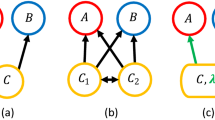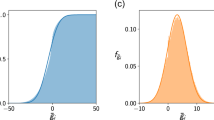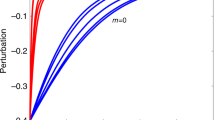Abstract
ROBERTS1 added a new dimension to the stability analysis of model ecosystems—feasibility, the requirement that equilibrium densities of species be positive. Previous work2–4 studied the stability of randomly constructed interaction matrices, S, which represented ecological interactions in the neighbourhood of an assumed feasible equilibrium point.
This is a preview of subscription content, access via your institution
Access options
Subscribe to this journal
Receive 51 print issues and online access
$199.00 per year
only $3.90 per issue
Buy this article
- Purchase on Springer Link
- Instant access to full article PDF
Prices may be subject to local taxes which are calculated during checkout
Similar content being viewed by others
References
Roberts, A., Nature, 251, 607 (1974).
Gardner, M. R., and Ashby, W. R., Nature, 228, 784 (1970).
May, R. M., Nature, 238, 413 (1972).
May, R. M., Model Ecosystems (Princeton University Press, Princeton, 1973).
Case, T. J., and Gilpin, M. E., Proc. natn. Acad. Sci. U.S.A., 71, 3073 (1974).
Odum, E. P., Fundamentals of Ecology (Saunders, Philadelphia, 1971).
Author information
Authors and Affiliations
Rights and permissions
About this article
Cite this article
GILPIN, M. Stability of feasible predator-prey systems. Nature 254, 137–139 (1975). https://doi.org/10.1038/254137a0
Received:
Issue Date:
DOI: https://doi.org/10.1038/254137a0
This article is cited by
-
Colonization–competition dynamics of basal species shape food web complexity in island metacommunities
Marine Life Science & Technology (2023)
-
Intrinsic ecological dynamics drive biodiversity turnover in model metacommunities
Nature Communications (2021)
-
Competitive coexistence of seasonal breeders
Journal of Mathematical Biology (2021)
-
The predictability of ecological stability in a noisy world
Nature Ecology & Evolution (2019)
-
Feasibility and coexistence of large ecological communities
Nature Communications (2017)
Comments
By submitting a comment you agree to abide by our Terms and Community Guidelines. If you find something abusive or that does not comply with our terms or guidelines please flag it as inappropriate.



